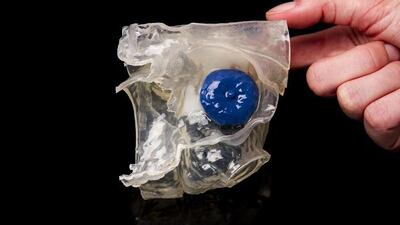Cleveland Clinic Abu Dhabi is using cutting edge three-dimensional printing technology in its cardiac procedures to customise care for its patients.
First used in February, the Mubadala-owned hospital has applied 3D printing in four surgeries so far.
“The advantages [of the technology] can be grouped into three categories: procedural planning, live guide and quality assurance,” said Dr Thomas Bartel, the section head for interventional cardiology at the Cleveland Clinic Abu Dhabi’s Heart and Vascular Institute.
Currently, it is used at the institute for certain heart surgeries and non-coronary catheter-based interventions, such as valve and device implants and surgery for congenital heart diseases. The facility is also exploring integrating 3D printing technology in other applications within the institute as well as the radiology department.
After a CT scan of the heart is taken at the hospital, the image is sent to a third party where engineers develop a 3D model using the scan. This is then sent back to the Cleveland Clinic Abu Dhabi physicians.
Globally the usage of 3D printing in medicine has been on the rise over the past few years, and it is commonly used to design tissues and organs, create customised prosthetics and implants, and aid in pharmaceutical research.
Last year, doctors at Abu Dhabi’s Sheikh Khalifa Medical City used the technology to perform a paediatric heart surgery. Sharjah’s Al Qassimi Hospital uses the technology to create surgical models of organs and body parts for cosmetic surgery patients.
In complex cardiac procedures involving hard-to-reach areas around the heart, a 3D organ replica provides an accurate image and helps to plan the surgery by giving physicians clear sight of any target region and what to expect in the operating room, according to Dr Bartel.
“If any concerns arise during the operation, we can use the 3D organ replica to determine the best course of action in real time,” he said.
“Post-surgery, in cases where a valve implant was not inserted accurately or if a physician is not completely satisfied with the outcome of a procedure, 3D models can be used as a basis for quality assurance to identify the cause of any adverse outcomes.”
Despite the advantages, the technology requires more research and development for further practical application in medicine.
“At the moment there is limited scientific evidence in terms of benefit and accuracy in cardiovascular medicine and heart surgery,” according to Dr Bartel.
“However, scientific studies are pending,” he said. “The costs of 3D printing are still high, which can be a barrier to exploring applications.”
The printing of 3D models is not typically covered by health insurance in the UAE.
ssahoo@thenational.ae
Follow The National's Business section on Twitter

